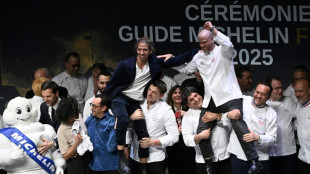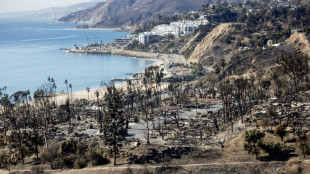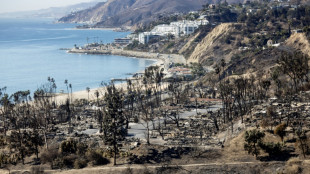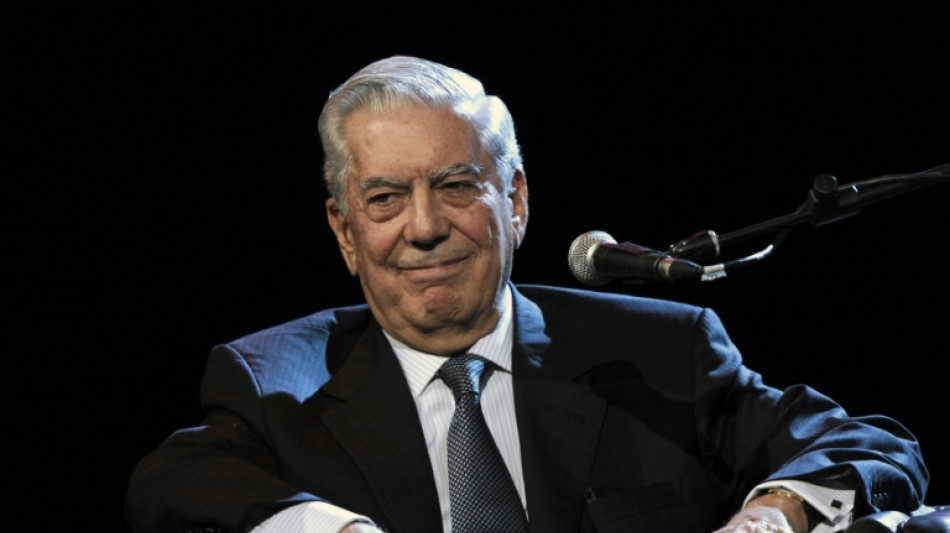
-
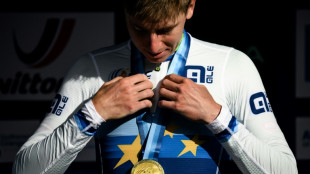 Unstoppable Pogacar targets more history at season-ending Il Lombardia
Unstoppable Pogacar targets more history at season-ending Il Lombardia
-
Ex-All Black Kerr-Barlow relishing Top 14 reunion with 'juggernauts' La Rochelle

-
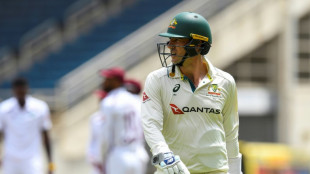 Australia in 'tight' race to have Cummins fit for Ashes opener
Australia in 'tight' race to have Cummins fit for Ashes opener
-
Giants stun Super Bowl campion Eagles 34-17

-
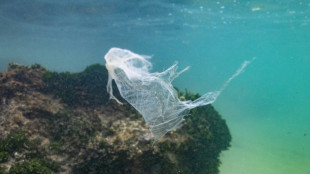 Plastic pollution treaty not dead in the water: UN environment chief
Plastic pollution treaty not dead in the water: UN environment chief
-
Major quake strikes off southern Philippines

-
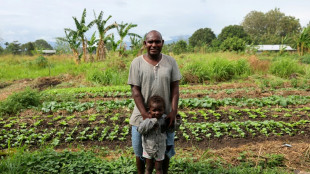 'Backyard fireworks' of WWII bombs still litter Solomon Islands
'Backyard fireworks' of WWII bombs still litter Solomon Islands
-
Europe needs reusable rockets to catch Musk's SpaceX: ESA chief
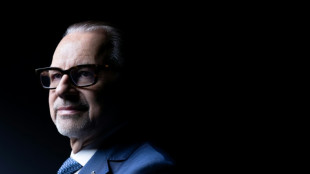
-
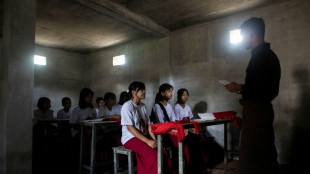 Myanmar air strikes force youth into bunker schools
Myanmar air strikes force youth into bunker schools
-
Asian markets limp into weekend as AI bubble fears grow

-
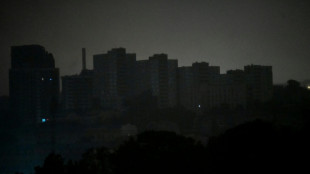 'Massive attack' cuts power in Ukrainian capital
'Massive attack' cuts power in Ukrainian capital
-
Dodgers win thriller to advance after Phillies blunder
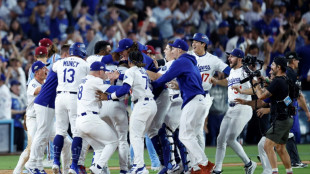
-
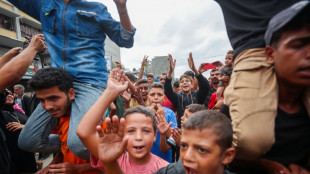 Israel government approves Gaza hostage release deal
Israel government approves Gaza hostage release deal
-
Venezuela ask for UN Security Council meet over US 'threats'
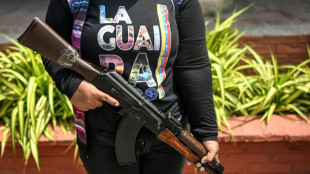
-
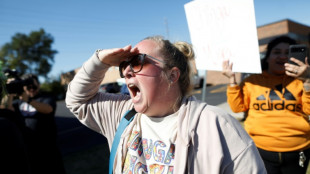 Fear and fury at ICE facility protest near Chicago
Fear and fury at ICE facility protest near Chicago
-
Morocco youth ask for king's ear at fresh protests
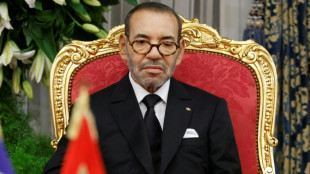
-
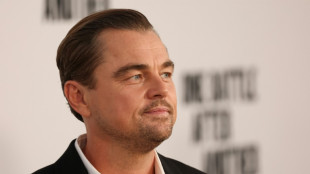 Comeback studio Warner takes 'victory lap' amid takeover rumors
Comeback studio Warner takes 'victory lap' amid takeover rumors
-
Death of 'sweet king': AI chatbots linked to teen tragedy
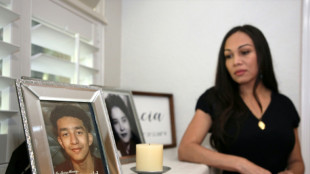
-
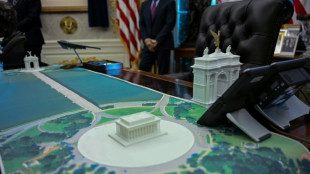 Arc de Trump? New monument model sits on US president's desk
Arc de Trump? New monument model sits on US president's desk
-
Sam Kerr poised to return for Australia's Matildas
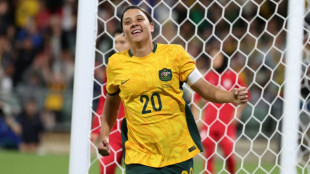
-
 US judge tosses Drake lawsuit over Lamar diss track
US judge tosses Drake lawsuit over Lamar diss track
-
Judge halts Trump's Chicago troop deployment as Portland decision looms
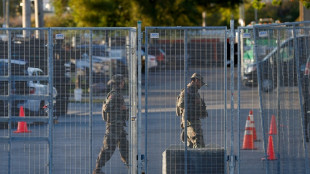
-
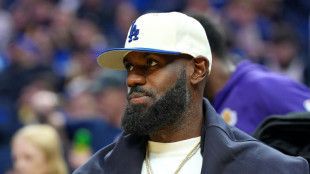 Lakers' James to miss NBA season-opener with sciatica: reports
Lakers' James to miss NBA season-opener with sciatica: reports
-
Saka lights up England's confident friendly win over Wales
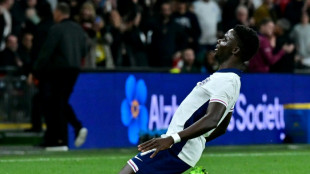
-
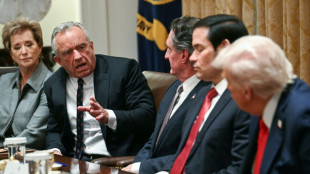 RFK Jr pushes fringe claim linking autism to circumcision
RFK Jr pushes fringe claim linking autism to circumcision
-
Tuchel slams 'silent' England fans
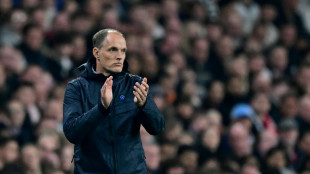
-
 Ex-Celtics star Pierce arrested on suspicion of drink driving
Ex-Celtics star Pierce arrested on suspicion of drink driving
-
Scotland sink Greece to boost bid to reach World Cup

-
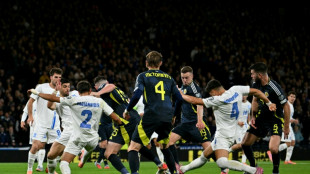 Scotland keep World Cup dream alive with Greece comeback, Dutch win
Scotland keep World Cup dream alive with Greece comeback, Dutch win
-
Trump says 'stepping up pressure' to end Ukraine war
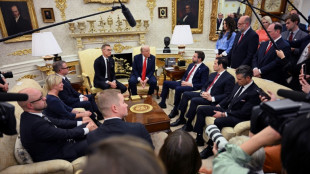
-
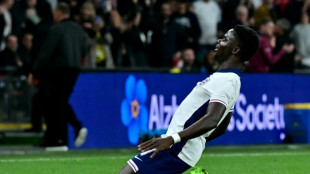 Saka gem headlines England's confident friendly win over Wales
Saka gem headlines England's confident friendly win over Wales
-
US finalizes $20 bn economic lifeline for Argentina, buys pesos
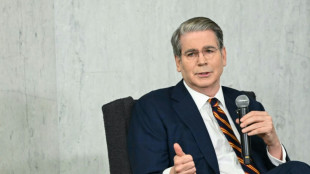
-
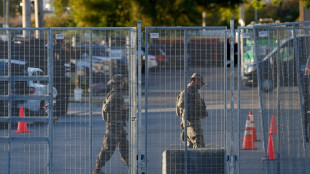 Troops deploy in Chicago as US courts hears challenges
Troops deploy in Chicago as US courts hears challenges
-
Chiefs, Ravens look for spark amid early season struggles

-
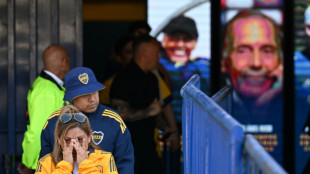 Argentina gives Boca Juniors manager Russo emotional stadium send-off
Argentina gives Boca Juniors manager Russo emotional stadium send-off
-
French guillotine abolitionist enters Pantheon
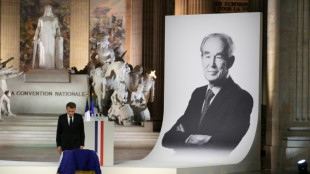
-
 Amoura scores twice as Algeria qualify for 2026 World Cup
Amoura scores twice as Algeria qualify for 2026 World Cup
-
Trump eyes Egypt trip, says hostages to be freed early next week
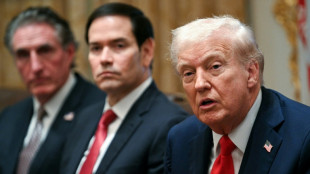
-
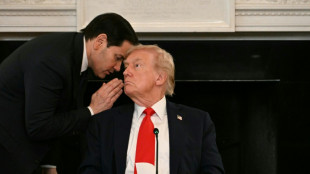 An urgent note, a whisper -- and a Gaza deal long sought by Trump
An urgent note, a whisper -- and a Gaza deal long sought by Trump
-
Police clash with protesters as thousands rally in Madgascar
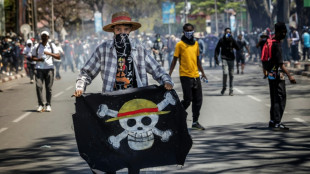
-
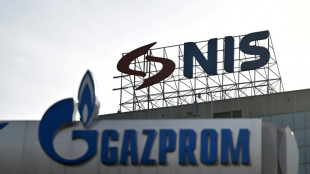 Serbia faces 'extremely serious' impacts as sanctions hit oil firm
Serbia faces 'extremely serious' impacts as sanctions hit oil firm
-
Rediscovered painting shows madam of notorious Nazi brothel
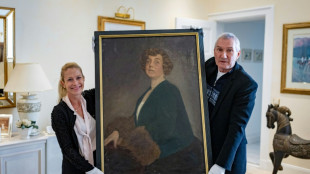
-
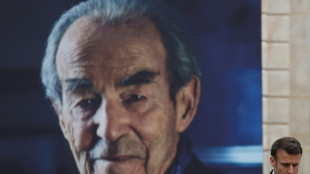 Grave of French guillotine abolitionist defaced before Pantheon ceremony
Grave of French guillotine abolitionist defaced before Pantheon ceremony
-
At German auto crisis meet, Merz vows to fight EU gas guzzler ban

-
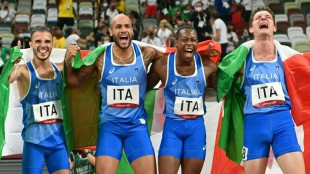 Italian athlete gets three-year ban for spying on Olympic champion Jacobs
Italian athlete gets three-year ban for spying on Olympic champion Jacobs
-
French court ups jail term for man in Pelicot rape case appeal
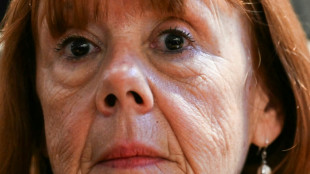
-
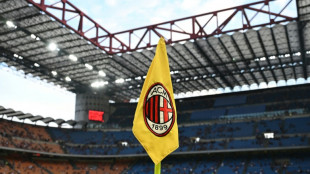 Rabiot backed by French players' union in row over Serie A match abroad
Rabiot backed by French players' union in row over Serie A match abroad
-
Hungary's 'master of the apocalypse' Krasznahorkai wins literature Nobel
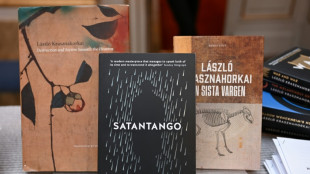
-
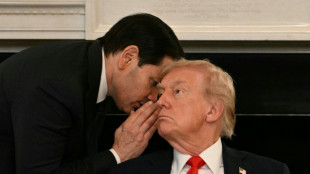 Israel says 'all parties' signed phase one of Gaza deal
Israel says 'all parties' signed phase one of Gaza deal
-
Nepal's youth vow to keep up pressure, one month after unrest
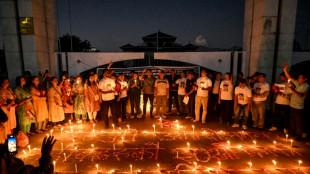
| CMSC | -0.08% | 23.69 | $ | |
| JRI | -0.79% | 14.01 | $ | |
| RBGPF | -0.24% | 75.55 | $ | |
| CMSD | -0.25% | 24.27 | $ | |
| SCS | -1.57% | 16.53 | $ | |
| AZN | -0.4% | 85.04 | $ | |
| NGG | -0.38% | 73.33 | $ | |
| GSK | 0.21% | 43.44 | $ | |
| BCC | -3.42% | 73.89 | $ | |
| RIO | -1.04% | 67 | $ | |
| RYCEF | -0.39% | 15.35 | $ | |
| BCE | 0.9% | 23.44 | $ | |
| BTI | -0.47% | 51.36 | $ | |
| VOD | 0.09% | 11.28 | $ | |
| RELX | -1.53% | 45.15 | $ | |
| BP | -0.67% | 34.29 | $ |

Vargas Llosa, last of Latin America's literary golden generation
Nobel laureate Mario Vargas Llosa was the last survivor of a golden generation of Latin American literary giants, his writing exploring universal themes often set outside his native Peru.
Admired for his depiction of social realities but criticised within Latin American intellectual circles for his conservative positions, Vargas Llosa -- who died Sunday at age 89 -- was a leading light of the "boom" generation that included greats like Gabriel Garcia Marquez and Julio Cortazar.
Winner of the 2010 Nobel Prize for Literature, Varga Llosa passionately believed writers should be involved in civil society.
"We Latin Americans are dreamers by nature and we have trouble telling the difference between the real world and fiction," he said.
"That is why we have such good musicians, poets, painters and writers, and also such horrible and mediocre rulers."
But he courted controversy over his support for the war in Iraq and was a passionate admirer of Britain's "Iron Lady" prime minister, Margaret Thatcher.
Author of a vast body of work, spanning historical novels, erotic romances, crime novellas, light-hearted comedies, plays, memoirs and essays, Vargas Llosa also kept his hand in current affairs by working as a journalist.
Unlike Garcia Marquez and other Latin American greats, he rarely strayed into magical realism, his style marked by graphic descriptions of murder, rapes and other violence, perhaps harking back to his days as a crime reporter in Peru's capital Lima when he was just 16.
"A writer must never turn into a statue. I have never liked the idea of a writer stuck in his library, cut off from the world like Proust was," he told AFP in an interview.
"I need to keep a foothold in reality. That's why I do journalism."
- Military school trauma -
Born in Arequipa in southern Peru on March 28, 1936 to a single mother, Vargas Llosa was taken to Bolivia as a baby, only returning a decade later when he met his father for the first time.
It was not a happy relationship, his father being "very authoritarian and severe", Vargas Llosa said in 2019.
"I lost my innocence and discovered loneliness, authority, adult life and fear.
"My salvation was reading good books, taking refuge in worlds... where I could feel free. And I became happy again."
At 14, his father sent him to Lima's Leoncio Prado Military Academy, an experience which he described as "traumatic", seeking solace in the world of books and writing.
On leaving, he worked at La Cronica tabloid before studying law and literature at San Marcos University while dictator Manuel Odria was in power, becoming very politically active.
- A scandalous marriage -
At 19, Vargas Llosa married his aunt Julia Urquidi. Although not a blood relative, she was a divorcee 10 years older than him and it was socially scandalous.
She encouraged his writing and when they moved to Madrid, he began his first novel "The Time of the Hero" (1963) based on his military academy experience, which he later finished in Paris.
Their decade-long marriage inspired his 1977 novel "Aunt Julia and the Scriptwriter".
He worked for a period in Paris as a journalist for Agence France-Presse (AFP) and Radio Television Francaise.
After his marriage broke up in 1964, Vargas Llosa married his cousin Patricia Llosa and had three children.
The couple separated in 2015.
- 'Unreserved admiration' for Thatcher -
All of his early novels are set in Peru, among them "The Green House" (1966), "Conversation in the Cathedral" (1969), and "Captain Pantoja and the Special Service" (1973).
Later writings were set further afield: "The War of the End of the World" (1981) tackled a military conflict in late 1890s Brazil, while "The Feast of the Goat" (2000) portrayed the 1961 assassination of Dominican dictator Rafael Trujillo.
After his Nobel win, he published "The Dream of the Celt" about Roger Casement, a gay British consul who wrote a 1904 report about colonialism's abuses in the Congo before becoming an Irish nationalist.
Like most of Latin America's intelligentsia in the early 1960s, Vargas Llosa initially supported Fidel Castro's leftist revolution, but later grew disillusioned, becoming an advocate of free-market capitalism whose political idol was Thatcher.
After her resignation in 1990, Vargas Llosa wrote of his "unreserved admiration" for Thatcher, praising her 11-year rule as "the most successful revolution in Europe this century and the one with the most powerful effect on the rest of the world".
The same year he ran for president in Peru representing a conservative coalition but lost to Alberto Fujimori, an unknown academic of Japanese descent.
Disappointed in defeat and upset by the dictatorial turn of Fujimori's regime, Vargas Llosa took Spanish nationality in 1993, angering many Peruvians.
burs/hmw/mg/fg/des
M.Betschart--VB

